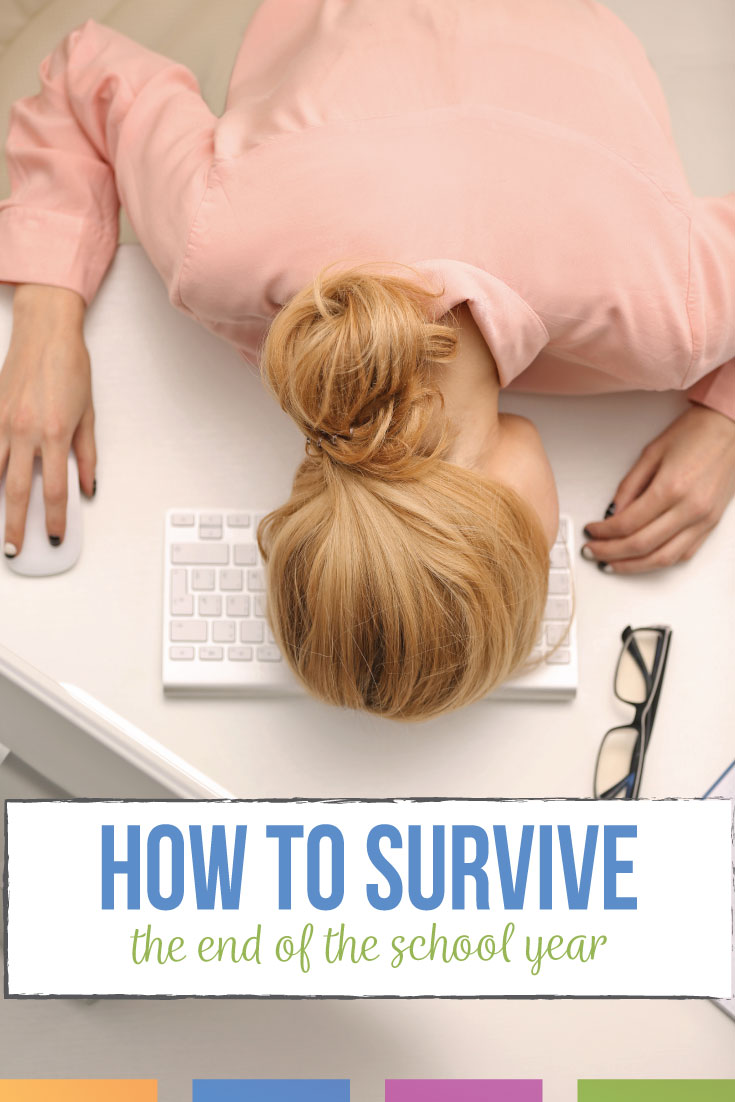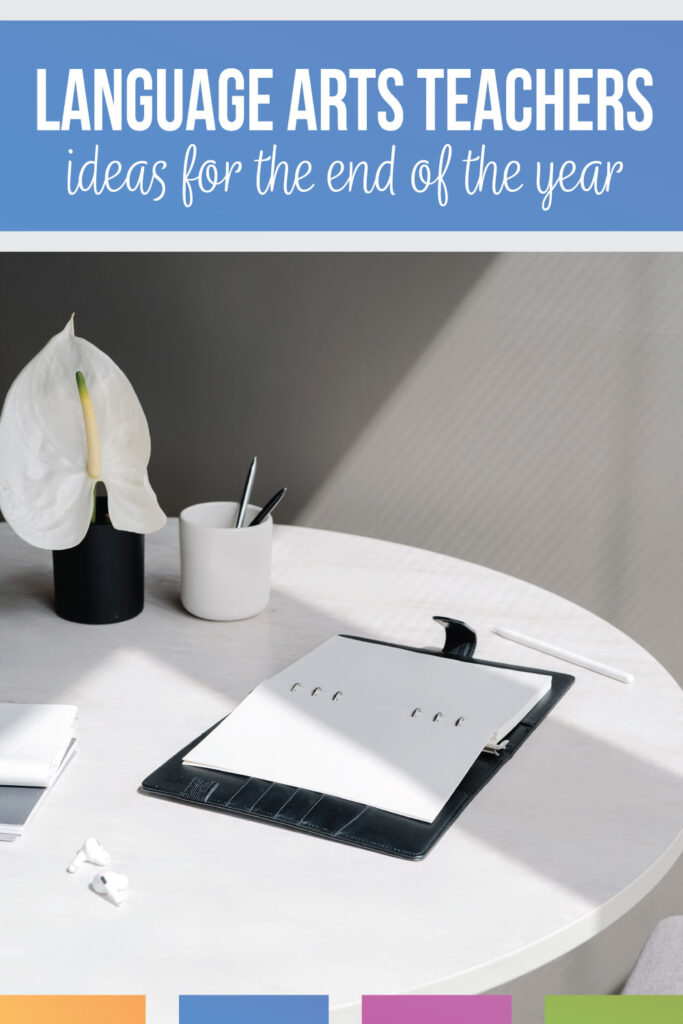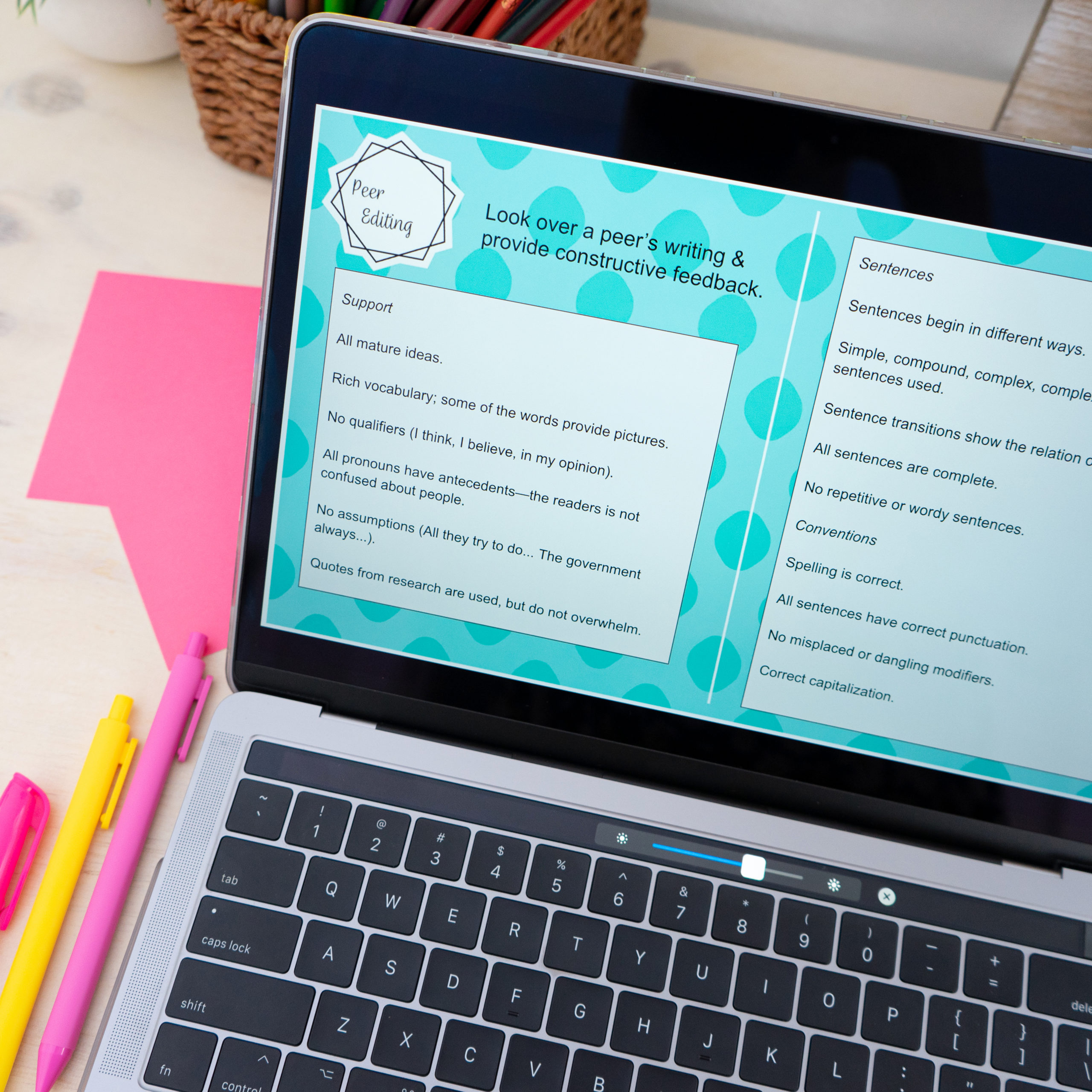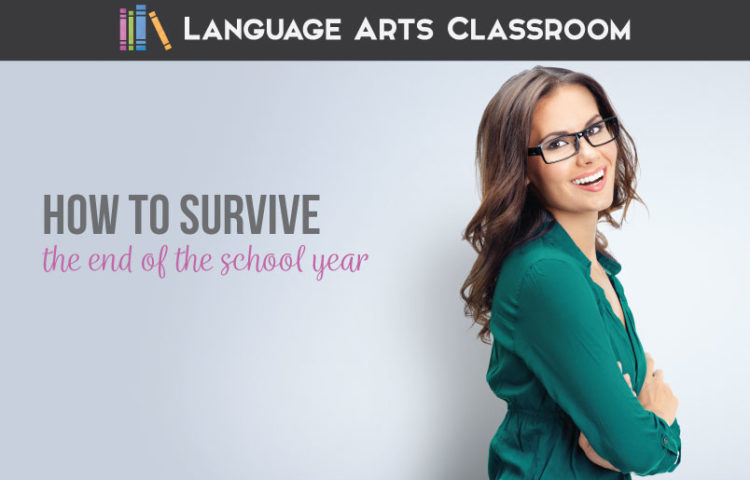Lately, a recurring question has shown up in my email: how do I survive the end of the school year? Language arts activities for May are here!
I’ll be super honest and tell my readers that on the first day of summer break, I come home and sleep. Simply, I collapse a bit. I can’t avoid the end of the school year exhaustion because as a secondary teacher, I am pulled many ways: honors night, book collection, finals, graduation, graduation parties, cleaning my room, next year placements, and on.
I do survive the end of the school year, but some years I have fared better than others.
How can a secondary English teacher survive the end of the school year?
As a secondary ELA teacher, I have a few tricks to survive the end of the school year. Below, I’ve combined ideas for the health of teachers and for polishing off hard work. Some of these ideas are specific for ELA lessons, but other ideas are helpful for all teachers.

Maintain consistency and routines.
I establish routines the very first day of school. If classes fall away from these routines, we review those procedures even toward the end of the year. Eventually, students realize routines help us and that I will hold them accountable.
Students thrive on consistency and even if we teachers find it difficult to maintain routines, we owe it to students to do so. Even though I join the ranks of exhausted teachers at the end of the year, my job is easier when I maintain the routines I worked so hard to establish nine months ago.
Show students where the class is headed.
I stumbled upon this by accident. Students were asking questions about due dates and final quizzes, and I pulled up my lesson plans. They loved it… seeing behind the scenes? Maybe they thought these were secretive documents? insider secrets? Nope, just a word document. (Insert shrugging emoji.)
I always try to alert students to upcoming assignments, but this act of complete transparency calmed my class. Now, I regularly show my students my lesson plans (with no revealing information!) especially at the end of the school year. When I return from spring break, I will show students the plan for the final four to five weeks. May ELA lessons? They are not secrets from my students. And the best part is, they can see where the class is headed and feel more prepared and motivated for the end of the school year.
Students feel some control and grumble less. Clarity with students really helps me survive the end of the school year.
Color.
I pull out crayons and colored pencils to survive the end of the school year. Students might be riled, and coloring can calm people! Review grammar with grammar coloring activities and literature with literary device sheets. The first time I added coloring with older kids, I was incredibly skeptical; they loved it.
The end of the school year can present interesting behavior. Allowing students to color has shown benefits. Now, coloring is a standard part of my language arts activities for May.

Take care of yourself.
Eat lunch. Bring fruit or veggies. Take the stairs. Drink water (and put down the coffee). Sleep at night.
The end of the school year is a whirlwind. Your health matters. You will be a better teacher if you are healthy.
Grading? Be smart.
Think of ways to maximize your efforts.
Here’s a trick I use specifically with student writing: pile all papers by student name. I will then ask Student #1 to come to my desk. I will conference over the papers and give feedback. Then, I will explain that I want one of the papers returned. My expectation is that this will be a very polished piece of writing since I’ve given feedback and the student had extra time to make corrections.
I’ll continue with each student. Now, students might turn in different papers! However, I have conferenced with students, provided feedback, and given the opportunity to make corrections. However, the final paper that I do grade is stronger and therefore, I take less time grading it than I would have previously. Students and teachers at the end of the year are exhausted. Give everyone some grace.
Step in the hall and read.
What do you want your students to do over summer break? I want mine to read, so I drive home this message one more time through my actions. I want to put up my feet and relax, but I know that students need that modeling a few more times.
Plus, we know that reading relaxes people. Reading benefits both you and your students. Don’t be afraid to incorporate independent reading as part of your May ELA lessons.
Review with movement.
Stations are the easiest way (for me, at least) to get students up and moving. I fill stations with a variety of tools, especially as we review for finals. For instance, I might have one station with writing errors. Another could have a grammar sort. (Ask students to take pictures of their finished product!) For literature, add analytical questions from a unit, and let students choose which question to answer while watching a mini-lesson video on YouTube. Another fun way to review with movement is by going on a scavenger hunt with skills they’ve been working on. This allows students to get outside and enjoy the warmer weather while also reviewing important concepts.
Get creative with station assignments, and the class period will move quickly. (You can also sign-up below to gain access to my station organizational tool. It’s completely editable, and you can add whatever pieces you’d like to the tool.)
Encourage read-alouds and summer reading.
Increasingly, I am exposing students to more literature through read-alouds. If I have time at the end of the hour, I will read a few poems or part of a short story. (Here are a few other ideas.) Consider children’s books too as they lend themselves to original lessons.
Last year was my first year trying this, and my goal is to increase the number of books students borrow over the summer. My classroom library will NOT help anyone boxed up over the summer. I send as many books home with students. This past year, most of my books made it back! My overall goal with a classroom library is that I average $1 per book, so if I don’t have a returned book, I don’t stress.
And? If you have not worked on First Chapter Friday all year, that is ok! Implement it for the last few weeks of the month; Fridays can be special in May.
Study in unique ways.
Mentimeter and Kahoot are interactive digital forums that will help you engage students. If you have never used digital sites for date and review, give them a chance! I know the end of the year can be overwhelming, but once you have the account set up, classes can learn at various times.
High school classes might look a little different because of final exams. A great idea is to model review and study skills in various ways.
Address media literacy.
The content for an ELA class is endless, and that content includes media literacy. This time of year, teachers often bring in movies and shows. Sure! Doing so is the perfect time for analysis.
Students respond well to media lessons because they realize that marketing strategies and the media are stacked against them. Students naturally have an interest in studying this. If you’ve taught The Hunger Games (or classes have access to the books), examine how reality television plays a role in manipulating the audience.
Another opportunity for media literacy involves marketing tools and branding material from everyday packaging. Water bottles, fast food containers, candy bar wrappers… all of those items include marketing. Teach students the hidden secrets of marketing for an engaging end of the year activity.
Begin summer review.
I have never handed students a packet of work for the summer; I encourage students to read over the summer. However when I taught eighth grade, we prepped for the next grade level. Informing students about their next steps fits nicely in the final weeks of school.
When I once taught summer school, we reviewed the last days. Then when I began my summer school class, students were accustomed to my format.
As the school year draws to a close, it’s natural for teachers to feel the pressure mounting. However, by implementing these tips and tricks, educators can navigate the final part of the school year with confidence and resilience.
May ELA lessons can polish the end of your long year of hard work, sort of like tying a bow on the lessons you’ve taught. Use activities that allow for a meaningful and great way of culminating your messages from the school year.
Finally, take a deep breath. The end of the school year is exhausting. August seems so, so long ago. We all need to survive the end of the school year and begin summer review, especially during those last days of school. Take care of yourself and implement engaging activities so that you and students end the year in a positive way.
Not quite ready for the end of the year? Try April language arts lessons.



